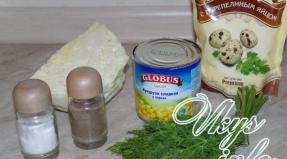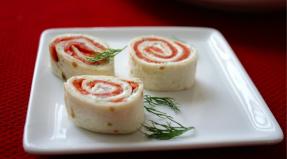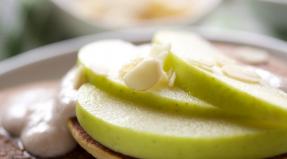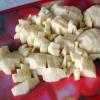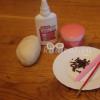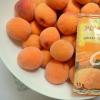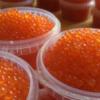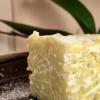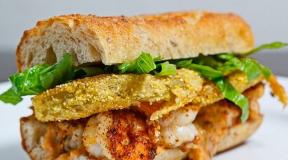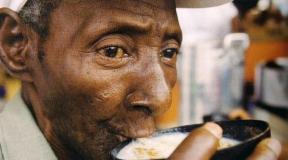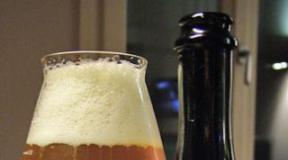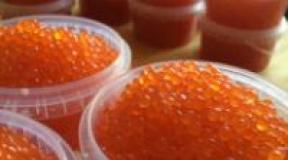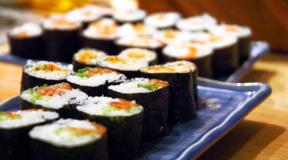Rotten Eggs Chinese delicacy. Centennial eggs in Chinese cuisine
Black eggs in China are also called "centennial". In Chinese皮蛋 - phi dan... So they were called because of appearance and due to the fact that they can be stored for quite a long time. These eggs are also called "imperial". In a word, a delicacy and one of the favorite snacks of the Chinese.
The history of the dish
It is said that somewhere in the Hunan province, six hundred years ago (during the Ming Empire), a Chinese man found eggs in slaked lime, which was used several months ago to build his house. He dared to try them and, as you might guess, he liked it ... He decided to cook for himself in the same way, but at the same time added salt for taste - and this fabulous dish was born. Then, due to the scale of Chinese culture, black eggs were popularized in other Asian countries.
Allocate traditional and modern ways of preparing the delicacy
Traditional
For this snack, duck or chicken eggs, much less often quail. In the traditional way they still cook, modern ones are used so as not to mess around for a long time. If you are a person of the old school or just want your egg to be preserved longer, then first mold some kind of paste. Take hot water, pour tea into it, add clay and ashes of burnt oak, sea salt, calcium oxide, stir, wait until it thickens, mold it all onto an egg, and then roll it in rice husks and straw - this is done so that the eggs do not stick to each other. It is worth doing all the manipulations manually with gloves, because you can get a chemical burn. Then you put all this stuff in baskets and bury it in the ground. This entire process can take about a month or two. Have you already ran to look for ingredients?) If not, let's turn to the second method.
Modern
This way is that raw eggs soaked in various chemicals (in solution table salt, calcium hydroxide and sodium carbonate, for example), left for ten days, then coated with clay and wrapped in a film, kept so for several more weeks. It doesn't matter if you buried your egg, put it in a jar, or simply wrapped it in foil - the main thing is that no air gets in. Leave the eggs alone for a while, letting them bathe in this alkaline environment with might and main. Through the pores in the shell, everything will reach the address and they will take on the proper consistency.
The Chinese have come up with a thousand and one ways to interpret and cook a "centenary" egg, the ingredients vary, but, again, the essence remains the same - let it stay in an alkaline environment and in no case allow air to enter.
Why don't the Chinese want to eat fried or boiled eggs?
Because for the Chinese, eggs are, first of all, not what is tasty, but what is useful. Wang Shi Siong wrote in his book that canned eggs have varied tastes, help with hangovers, diarrhea and can even energize. V Chinese medicine black eggs are actively used for eye pain, tinnitus, toothache, and they also reduce high pressure and relieve dizziness. They are believed to be best stored in a cool, dry place.
It should be borne in mind that the amount of lead oxide in some of the eggs can simply go off scale and this plunges ordinary people into shock.Oxide significantly speeds up the cooking process, which is why dishonest manufacturers often indulge in it.
The savvy Chinese have adapted to this - a method of preparing a lead-free snack has been developed so that people who actively consume canned eggs do not ruin their health. Instead of lead, zinc is used, although it is also not particularly useful. Eggs smell of ammonia due to decomposed amino acids and other chemical reactions, so when you eat eggs, it is recommended to add a little vinegar to reduce the amount of alkaline substances and give the egg more nice smell and taste.
Plus, these eggs are really cool and have their own special twist. Centenary eggs are also called松花蛋 sleep hua dan.
What does it mean and why was it called that?
And not just like that! 松花 sleep hua - pine flowers, and蛋 dan - egg... As a result, eggs are obtained on which there is a pattern in the form of pine needles. Due to the fact that the egg is left for a long time, some proteins break down into amino acids, and amino acids, in turn, can interact with both alkaline and acidic substances. Thus, people deliberately add some alkaline substances such as lime, potassium carbonate, and sodium carbonate. They pass through the pores in the eggshell, combine with amino acids and form amino acid salts. They are insoluble in proteins and crystallize into a certain geometric shape - beautiful pine patterns. The clearer the pattern, the better egg by quality. In general, do not bother!))

What does this black egg taste like?
This delicacy of Chinese cuisine did not pass me by either - I tried it. And I can't say anything bad about him. The taste is really specific, I ate it with my eyes closed, because I am an average foreigner, I am fooled by beautiful pictures"Sushi and pizza", and therefore expected the worst from this curiosity. But it didn’t taste as bad as it looked. The protein resembles a hard jelly with a taste of chemistry or some strange medicine, and the yolk is like the yolk, but its structure can be a little liquid and have a certain creamy taste, no matter how strange it sounds. But for me personally, I repeat, this dish reminded me of salted jellied meat with a taste of chemistry and with something slightly thin inside. In a word, you can eat.
Maybe these eggs are not for everybody, but I definitely cannot call them "disgusting". I can only wonder how the Chinese came up with the idea to cook it so tricky. In Ukraine, they just paint the eggs and that's it, we call it an Easter egg - we don't bury it in the ground. But the Chinese black testicle is also original and unusual, for example, the same patterns on the squirrel. Where else can you see this?
Summing up, I want to say that each person has their own taste preferences and receptors, so this egg may remind you of something of its own and you will disagree with me. It seems to someone sharp, for example. Share your opinion with us and never be afraid to try something new. After all, black eggs are the same eggs, only in profile.
Centenary Eggs June 17th, 2014

Recently, the American broadcaster CNN, with the help of its so-called citizen correspondents, compiled a list of the most disgusting dishes in the world. The main gruesome delicacy was named “ centenary eggs» — a traditional dish Chinese food. A few days later, the Chinese themselves reacted to CNN's insolence - they took offense at the TV company, accused its employees of ignorance and demanded an apology.
"Century egg" (CENTURY EGGS) or as it is also called "millennial egg" is a Chinese delicacy. This is a black artificially aged egg that never goes bad.
Let's find out how it turns out this way ...
Photo 2. 
The eggs are covered with rice husks, clay, salt and ash. The eggshell protects them from these elements and microbes for several months while they are buried. Eggs have a different consistency than their fresh counterparts. The protein turns into a creamy brown jelly, and the yolk turns into a black powdery substance. Consumption of "centenary eggs" is believed to heal high blood pressure and relieves bad appetite. Historically they are made from duck eggs, but goose, chicken, turkey and quail eggs can be used as an alternative.
Photo 3. 
The modern way of cooking may differ from the traditional one. New methods include soaking the eggs in a very strong alkaline solution. Sometimes zinc or lead oxide is added to soften the yolk of "centenary eggs". The main catalyst for the physicochemical changes that take place in buried eggs is sodium hydroxide, which is formed in the paste or solution that covers the eggs. This alkali causes changes in the color and consistency of the egg components.

Centenary eggs have a scent that resembles some cleaning products. Hydrogen sulphide and ammonia, which are produced during the fermentation process, give the eggs their distinctive signature imprint. Eggs can be used as a side dish or served separately. Most often they are eaten with tofu or with rice broth and pork. Since some cooking methods involve the use of lead oxide, there is a chance that it will get into the product. You don't have to visit China to taste the "centenary eggs". In most Asian grocery stores outside the region, you can find this delicacy.
Photo 5. 
Traditions national cuisines sometimes they are very ambiguous: somewhere it is considered commonplace to eat a fried guinea pig for lunch, somewhere they prefer soup made from duck blood, well, in some places, eggs of unsightly color are served to the table, which have lain in the ground for a couple of months. And nothing - people eat. True, for some who are used to, for example, eating cheeseburgers with cola, this approach to the diet seems, to put it mildly, strange.
This is understandable - gastronomic traditions have been formed over the centuries in a certain territory, and travel far beyond its borders is often dangerous and unpleasant. Even today, for example, not everyone can cope with the natural disgust that acts as a kind of accident insurance in case of acquaintance with exotic food - it will not be very polite for a beginner if he suddenly vomits at the hospitable table of foreign friends.
Photo 6. 
To try the "century-old eggs" that look like some kind of alien jelly, you don't have to go to a remote Chinese village. You can just go to the supermarket and buy a package of these ugly, but obviously beloved by the Chinese eggs. Several companies are engaged in the production of such products, but the largest of them is currently Shendan, whose employees seem to read CNN Go from time to time.
Photo 7. 
Otherwise, explaining what happened literally a week after the publication of the list of disgusting food is difficult. Here's what happened: On July 6, the chairman of the board of directors of Shendan and three thousand of his subordinates filed a complaint with CNN, in which they demanded an apology for awarding the "hundred-year-old eggs" the title of the most disgusting food in the world.
The document says, among other things, that the employees of the American television company made completely unfounded and unscientific conclusions about taste famous chinese appetizer... And this circumstance indicates that the authors of the note about national dishes showed disrespect for foreign culture, and also demonstrated their ignorance and arrogance.
Photo 8. 
On the one hand, comrades from the Shendan egg company can be understood - who will like it if your favorite food is called utterly nasty, which cannot be eaten without tears in your eyes and the urge to vomit. But on the other hand, if you look at the situation a little differently, you can come to simple and obvious conclusions.
The private opinion of a person who bought for the sake of a culinary experiment cannot be called ignorant and arrogant. unusual food... Even if the author of a note about them had armed himself to the teeth with all sorts of theoretical calculations about the history of the origin of the recipe and the benefits of the product, before taking a sample from the "centenary eggs", he would hardly be able to oppose this knowledge to the reaction of his taste buds.
Photo 9. 
After all, CNN's civilian correspondent was honest about the experience, and the vibrant emotions of a typical Western person give a better idea of the taste of an oriental product than traditional, healthy dish with a rich history ". After all, readers are waiting for the assessment, and not for what they themselves are able to read in the culinary encyclopedia.
In a word, before starting to write an angry complaint, the Chinese company should not forget that there are really many rather peculiar and strange dishes in the world and their popularity directly depends on the culinary preferences of not only different nationalities in general, but also of individual people in particular (so moreover, some of the inhabitants of China speak of the simplest and most familiar cheese to most people in the West in about the same way as the author of a short article in CNN Go - about "hundred-year-old eggs").
It is possible that among the readers of this text there will be one fearless fan of "hundred-year-old eggs" who subscribes them for big money directly from China and at the same time cannot stand fried potatoes, calling it nothing less than the most disgusting food in the world. So a large producer of egg products could not have paid any attention to someone's "fu".
This was done (at least for now) by other manufacturers of those unusual dishes who have been on CNN's list. In particular, Filipino woodworm larvae in a sauce of vinegar, salt and lime are located after the “centenary eggs” in the ranking. Until it occurred to the Filipinos to write a letter to CNN with a complaint with an argument in the style of "I don't count your stupid hot dog as food."
Photo 10. 
There were no angry letters from those who specialize in the production of fermented soy chips (Indonesia), products from dog meat and offal ( South Korea), fried spiders (Cambodia), fried cicadas (Thailand) and fried frogs (Philippines again). Because, probably, all these people have no time - they are busy with their own affairs, and crazy foreigners driving around different countries and making big eyes at the sight of locusts in sweet sauce, they are not decree.
And rightly so. Conflicts in which taste is the key are doomed to failure in advance. In the end, such clashes of opinion are about the same as a dispute about the beauty of a particular shade of color. All the same, everyone will remain unconvinced. And instead of quarreling over some nonsense, it's better to make yourself huge sandwich with tasty cheese, or no less tasty "hundred-year-old eggs" - that's as you like.
Photo 11. 
Europeans often call these eggs "rotten", and the Chinese, on the contrary, "imperial". Why is there such a difference in perception? As you know, "a billion Chinese people cannot be wrong" ...
Photo 12. 
Photo 13. 
The American television company CNN, with the help of its so-called civilian correspondents, has compiled a list of the most disgusting dishes in the world. The main gruesome delicacy was called “centenary eggs,” a traditional Chinese dish. A few days later, the Chinese themselves reacted to CNN's insolence - they took offense at the TV company, accused its employees of ignorance and demanded an apology.
The traditions of national cuisines are sometimes very ambiguous: somewhere it is commonplace to eat a fried guinea pig for lunch, somewhere they prefer duck blood soup, and in some places they serve unattractive eggs that have lain in the ground for a couple of months. And nothing - people eat. True, for some who are used to, for example, eating cheeseburgers with cola, this approach to the diet seems, to put it mildly, strange.
This is understandable - gastronomic traditions have been formed over the centuries in a certain territory, and travel far beyond its borders is often dangerous and unpleasant. Even today, for example, not everyone can cope with the natural disgust that acts as a kind of accident insurance in case of acquaintance with exotic food - it will not be very polite for a beginner if he suddenly vomits at the hospitable table of foreign friends.
Photo 2.

"Century egg" (CENTURY EGGS) or as it is also called "millennial egg" is a Chinese delicacy. This is a black artificially aged egg that never goes bad.
The eggs are covered with rice husks, clay, salt and ash. The eggshell protects them from these elements and microbes for several months while they are buried. Eggs have a different consistency than their fresh counterparts. The protein turns into a creamy brown jelly, and the yolk turns into a black powdery substance.
Consuming "centenary eggs" is believed to cure high blood pressure and relieve poor appetite. Historically, they are made from duck eggs, but goose, chicken, turkey and quail eggs can be used as alternatives.
Photo 3.

The modern way of cooking may differ from the traditional one. New methods include soaking the eggs in a very strong alkaline solution. Sometimes zinc or lead oxide is added to soften the yolk of "centenary eggs". The main catalyst for the physicochemical changes that take place in buried eggs is sodium hydroxide, which is formed in the paste or solution that covers the eggs. This alkali causes changes in the color and consistency of the egg components.
Photo 4. 
Centenary eggs have a scent that resembles some cleaning products. Hydrogen sulphide and ammonia, which are produced during the fermentation process, give the eggs their distinctive signature imprint. Eggs can be used as a side dish or served separately.
Most often they are eaten with tofu or with rice water and pork. Since some cooking methods involve the use of lead oxide, there is a chance that it will get into the product. You don't have to visit China to taste the "centenary eggs". Most Asian grocery stores outside the region can find this delicacy.
Photo 5.


To try the "century-old eggs" that look like some kind of alien jelly, you don't have to go to a remote Chinese village. You can just go to the supermarket and buy a package of these ugly, but obviously beloved by the Chinese eggs. Several companies are engaged in the production of such products, but the largest of them is currently Shendan, whose employees seem to read CNN Go from time to time.

Otherwise, explaining what happened literally a week after the publication of the list of disgusting food is difficult. Here's what happened: On July 6, the chairman of the board of directors of Shendan and three thousand of his subordinates filed a complaint with CNN, in which they demanded an apology for awarding the "hundred-year-old eggs" the title of the most disgusting food in the world.
The document says, among other things, that the employees of the American television company made completely unfounded and unscientific conclusions about the taste of the famous Chinese snack. And this circumstance indicates that the authors of the note about national dishes showed disrespect for foreign culture, and also demonstrated their ignorance and arrogance.

On the one hand, comrades from the Shendan egg company can be understood - who will like it if your favorite food is called utterly nasty, which cannot be eaten without tears in your eyes and the urge to vomit. But on the other hand, if you look at the situation a little differently, you can come to simple and obvious conclusions.
The private opinion of a person who has bought unusual food for the sake of a culinary experiment cannot be called ignorant and arrogant. Even if the author of a note about them had armed himself to the teeth with all sorts of theoretical calculations about the history of the origin of the recipe and the benefits of the product, before taking a sample from the "centenary eggs", he would hardly be able to oppose this knowledge of the reaction of his taste buds.

After all, CNN's citizen correspondent honestly described the sensation, and the vibrant emotions of the typical Westerner give more insight into the taste of an oriental product than the phrase “traditional, healthy dish with a rich history” does. After all, readers are waiting for the assessment, and not for what they themselves are able to read in the culinary encyclopedia.
In a word, before starting to write an angry complaint, the Chinese company should not forget that there are really many rather peculiar and strange dishes in the world and their popularity directly depends on the culinary preferences of not only different nationalities in general, but also of individual people in particular (so moreover, some of the inhabitants of China speak of the simplest and most familiar cheese to most people in the West in about the same way as the author of a short article in CNN Go - about "hundred-year-old eggs").
It is possible that among the readers of this text there will be one fearless fan of "hundred-year-old eggs" who subscribes them for big money directly from China and at the same time hates fried potatoes, calling it nothing but the most disgusting food in the world. So a large producer of egg products could not have paid any attention to someone's "fu".
This was done (at least for now) by other manufacturers of those unusual dishes that appeared in the CNN list. In particular, Filipino woodworm larvae in a sauce of vinegar, salt and lime are located after the “centennial eggs” in the ranking. Until it occurred to the Filipinos to write a letter to CNN with a complaint with an argument in the style of "I don't count your stupid hot dog as food."
Photo 10.

There were no angry letters from those who specialize in the production of fermented soy chips (Indonesia), products from dog meat and offal (South Korea), fried spiders (Cambodia), fried cicadas (Thailand) and fried frogs (Philippines again). Because, probably, all these people have no time - they are busy with their own business, and crazy foreigners traveling around different countries and making big eyes at the sight of locusts in sweet sauce, they are not a decree.
And rightly so. Conflicts in which taste is the key are doomed to failure in advance. In the end, such clashes of opinion are about the same as a dispute about the beauty of a particular shade of color. All the same, everyone will remain unconvinced. And instead of quarreling over some nonsense, it is better to make yourself a huge sandwich with delicious cheese, well, or no less tasty "century-old eggs" - that's who you like.

Europeans often call these eggs "rotten", and the Chinese, on the contrary, "imperial". Why is there such a difference in perception? As you know, "a billion Chinese people cannot be wrong" ...

Photo 13.

Photo 14.

Photo 15.



Photo 18.

source http://masterok.livejournal.com/3828228.html
This is how it happens - you screw up 8 hours at work, you come home, and there you will find the most disgusting dinner in the world. As part of Vikin's cultural enrichment, a Chinese friend said to forget everything we know about Chinese restaurants that are North America all the same, all opopsevshivye within the framework of sanitary standards and the expectations of average customers. So Roxy volunteered to cook real Chinese food.
Disgusting. But do not think that I speak so negatively about everything chinese cuisine or about Roxy's abilities. No, it's just that this dish called "The Centennial Egg" usually tops all ratings of the most disgusting dishes in the world.
Pitan (皮蛋) - centenary egg


As a result of a chemical reaction, the alkalinity of the yolk greatly increases, and its pH rises to 9-12 like that of soap. As a result of the reaction, the protein acquires a jelly-like consistency and deep amber, and on its surface microscopic crystals form a pattern similar to frost on a window. It is believed that the larger and clearer the drawing, the better quality eggs, so ours is so good.

The yolk becomes dark gray and creamy with shades from green to black - more liquid inside than outside.

Feels like nice soft french cheese, solid on the outside and almost liquid on the inside. By the way, French cheese itself successfully tops the Chinese lists of the most disgusting dishes.

Taste ... how to describe it, something from an overcooked egg to crumpled, if such could exist, or maybe from a fermented oyster. Once I mixed all the medicines in the house one tablet at a time and set it to brew on the battery, there was a similar smell.
A bit spicy, with the smell of ammonia, and there is still something that looks like sinusitis. In short, we definitely lack the gene that allows us to appreciate this snack.

Much spicy Chinese cabbage and a bottle of beer will help keep the entire ammonia palette of flavor inside. The main thing is not to think about eating a rotten egg.
In the next episode, Vika treats Roxy with borscht and cheese cakes.
The most disgusting dinner Pitan (皮蛋) - centenary egg was last modified: September 21st, 2016 by Anton Belousov
As soon as I got a room in Shenzhen, I went to the grocery store for exploration - acquaintances and not so much. There was a lot of strange things in the supermarket and it's not clear what's inside the boxes and packages with hieroglyphs and absolutely meaningless pictures. Having already typed a bunch of all sorts of oddities (half of which I threw away as soon as I tried), I got to the rows with eggs. O! Breakfast! I take it!
Next to completely Soviet whites and - probably - chicken eggs, lay such slightly bluish-greenish specks and with a label on which in the Koryak aglitsky it was written that these were duck eggs. After reading this, I remembered that I once ate duck eggs. But it was so long ago that it is no longer true. Took the duck, remember what it is.
In the morning, a frying pan on the stove, butter in a frying pan ... I took out a couple of eggs, fearing Chinese unsanitary conditions, just in case I washed them with soap ... The pan had already warmed up by this time, so taking a knife, I hit the shell of the first egg.
And something went wrong ...
It didn't break.
Having picked the shell, an interesting thing became noticeable: the egg inside was black and dense, like a boiled one. My knowledge of zoology did not include the knowledge of how strange this is for duck eggs, so I sniffed, tasted some tiny bite, didn't understand and decided to postpone it until better times.
At work, I asked our Chinese (teaching assistants) what it was. They didn't really explain anything to me, but they said that you can crumble it into rice, after boiling it.
Which I did when I came home. More precisely, I boiled them and cleaned them for cutting and crumbling into rice. The egg looked like this (the photo is not mine this time, well, I didn't guess ... So I take masterpieces from some Chinese sites):
Cut and sniff. On the cut, they are no longer so beautiful, but also very unusual ...

The egg gave off strong ammonia. And then I remembered. Somewhere I read about strange food from all over the world. And there was about pickled chinese eggs, which are typical for the Guangdong province where I lived. Some call them century-old and some millennial eggs. According to the Internet, it turned out that first a mixture of lime, ash and horse urine was prepared (however, not all sites referred to urine), coated eggs with this and left for 100 days. Here.
But also there was something about the fact that be sure to try them in one of the Chinese restaurants, so buying them at a nearby supermarket was a surprise to me.
Well, ammonia was pouring down very hard, but how can you not try it! So she took a bite. Honestly chewed and swallowed. I shoveled the rest in the trash. The taste for me was reduced to one single association in the brain - pungent.
Vopchem, the pleasure is dubious, but these eggs look very cool. Leaving China, I came up with entertainment: I bought a couple of them and began to treat friends - Russians in Thailand (by the way, then I saw them in stores here too. pink color) + an Italian friend came to me in Malaysia ... Of course, there was no limit to the delight of friends - they say, there was nothing more pleasant to bring something as a gift ?? But everyone tried it honestly. However, no one was impressed enough to eat the whole egg.
Read also ...
- Chicken liver pate
- Delicious zucchini with cheese in sour cream in the oven - a step by step recipe with video Zucchini recipes in the oven with sour cream
- Banana rice and corn flour pancakes (gluten free) with homemade banana sauce Banana pancakes with semolina
- Cabbage casserole with chicken Chicken fillet casserole with cabbage
